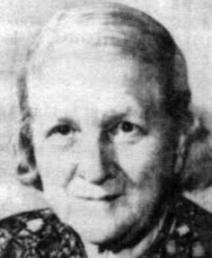 Rózsa Péter (1905 Budapest - 1977 Budapest)
Rózsa Péter (1905 Budapest - 1977 Budapest)
Rózsa Péter (maiden name Politzer) is one of the great personalities of 20th century mathematical theory. She belongs among those unique people whose life can be considered exemplary as a researcher (in the field of recursive functions), teacher and writer. Although she received several awards for her work, her name fell almost into oblivion alongside with those contemporary Eastern-European scientists (Gödel, Turing, Church, Kleene) who can be mentioned next to Rózsa Péter.
"There is no other field that can offer one the pleasure of discovery as much as mathematics which is probably the biggest human delight"- said Rózsa Péter in her public lectures that she held quite often under the title "The beautiful mathematics".
In 1922 she went to Eötvös Loránd Science University with the intention to study chemistry but soon found out that her real interest was in mathematics. She studied with mathematicians famous all over the world such as Lipót Fejér and József Kürschák or László Kalmár who she worked with for a long time and who was the first to draw her attention to the special field of recursive functions. After graduating she worked as a secondary school teacher from 1927.
Kalmár introduced her Gödel?s theorem of non-completeness according to which Rózsa Péter formulated her own argumentative theorems. In her lecture on recursive functions held at an international mathematical conference in Zurich in 1932 she suggested for the first time that they should be investigated as a separate branch of mathematics. Many more scientific publications followed, which resulted in a summa cum laude doctorate in 1935.
Following the fascist laws in 1939 she was not allowed to teach any longer and was forced to move to the Budapest ghetto for a short time. Péter kept on working during the war years as well. In 1943 she had a book published with the title "Playing with Infinity". Rózsa Péter intended her book primarily to intellectuals whose main interest had not been mathematics. The book, as a result, is written in such a way that readers with poor qualification can also understand it and have pleasure in it.
After the war when new colleges were established she started to work at the Budapest Teacher Training College.
In 1951 she had a monograph published with the title Recursive Functions which was issued several times and which brought her great recognition by winning the Kossuth Prize. When the college closed in 1955 she became professor at Eötvös Loránd Science University until her retirement in 1975.
The woman whom many generations of students remembered only as Aunt Rózsa worked for girls and young women to have more opportunity in the field of mathematics.
She died the night before her birthday in 1977. Former student Ferenc Gezwein reminded what Rózsa Péter said once. She thought that facts were only good unless they were able to unwrap the mind and the soul in the eternal search for truth.
Selected works:
Playing with Infinity: Mathematics for Everyman. Translated by Z. P. Dienes, Simon and Schuster; Dover Books edition, 1977;
Recursive Functions. Translated by István Földes. New York: Academic Press;
"Mathematics is Beautiful." Translated by Leon Harkleroad. The Mathematical Intelligencer 12: 58-64.
Link:
Portraits of Rózsa Péter
Biography:
http://www-groups.dcs.st-and.ac.uk/~history/Mathematicians/Peter.html
http://www.sdsc.edu/ScienceWomen/peter.html
Autorithy:
Rózsa Péter Secondary Grammar and Technical School